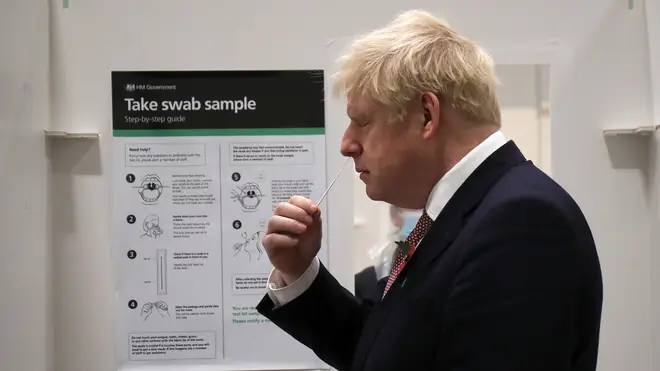
James Hanson 4am - 7am
18 July 2021, 10:03 | Updated: 18 July 2021, 11:35

Boris Johnson and Rishi Sunak were planning to avoid self-isolating after coming into contact with Covid-positive Sajid Javid, before pulling a U-turn. So what is the daily contact testing pilot scheme?
On Saturday morning, Health Secretary Sajid Javid posted a video on Twitter announcing he had tested positive for Covid with a lateral flow test. Later on Saturday evening he added that this had been confirmed with a PCR test.
In the days running up to the positive test, the health secretary had spoken in Parliament, visited a care home and attended a meeting with the prime minister at Downing Street.
Read more: Johnson and Sunak 'pinged' by NHS Covid app after Javid tests positive for coronavirus
Read more: NHS Covid app 'Pingdemic' in numbers
However, on Sunday morning, No10 revealed that despite the prime minister and chancellor being "pinged" by the NHS Covid app and told to self-isolate, they would not be doing so.
Instead, they said the two would be participating in a daily contact testing pilot to allow them to continue to work from Downing Street.
After an uproar, just hours later Downing Street announced a huge U-turn, with Mr Sunak tweeting: "I recognise that even the sense that the rules aren’t the same for everyone is wrong. To that end I’ll be self isolating as normal and not taking part in the pilot."
So what is the daily contact testing pilot? What are the rules for the scheme? And can I join the daily contact testing pilot?

Health Secretary Sajid Javid tests positive for Covid-19
The daily contact testing pilot scheme was launched in April 2021 to help understand if daily testing could replace self-isolation for people without symptoms who came into close contact with someone who has Covid.
People who are notified by NHS Test and Trace that they are close contacts can be invited to take part in the study.
There are two groups in the study. Participants can be given one PCR test and told to self-isolate for the full 10 days even if their test result is negative - as is normal.
Or they can avoid self-isolating through conducting daily lateral flow tests for seven days, as well as two PCR tests.
The group an individual is allocated to is chosen "at random", according to the government's press release.
It is currently unclear whether Boris Johnson, Rishi Sunak and Michael Gove were all allocated at random to the daily testing group or whether this was at the request of Downing Street.

James O'Brien caller says she is going back into isolation from Monday
Even for people in the pilot trial of daily testing, they are asked to follow a number of measures to reduce their close contact with others "as far as possible".
Trial participants are asked to only make essential trips outside for work, education, food, exercise or a medical or personal emergency.
They are also asked to open windows wherever they can, and avoid:
Read more: Michael Gove pinged by NHS app - but does not have to self-isolate

'Monday, how's it looking?' 'Not great.'
The criteria for who can join the daily contact testing pilot is very broad. People who are traced as contacts can take part if they have no symptoms, live in England, are over 18 and not in full-time education, and are not under any travel quarantine rules.
You can join the daily contact testing pilot scheme on the Public Health England site.
However, in practice the scheme has been largely limited to the employees of some business and public sector organisations.
Around 20 public sector organisations including the Cabinet Office, Downing Street, Border Force and Transport for London are part of the scheme.